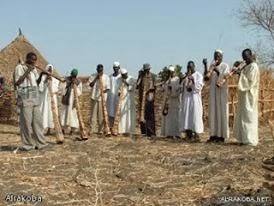Mahdist War
| |||||||||
Depiction of the Battle of Omdurman (1898). | |||||||||
| |||||||||
Belligerents
| |||||||||
|
| |||||||||
Commanders and leaders
| |||||||||
British Empire:Charles Gordon †
Sir Garnet Wolseley Sir Herbert Kitchener
Italy:
Oreste Baratieri Giuseppe Arimondi
Ethiopian Empire
Yohannes IV † |
Mahdist Sudan:Muhammad Ahmad
Abdallahi ibn Muhammad (KIA) Several other advisors, Emirs, and officers | ||||||||
Casualties and losses
| |||||||||
~17,821 to all causes
|
~73,148+ to all causes
| ||||||||
Background
[edit]Throughout the period of Turco-Egyptian rule, many segments of the Sudanese population suffered extreme hardship due to the system of taxation imposed by the central government. Under this system, a flat tax was imposed on farmers and small traders and collected by government-appointed tax collectors from the Sha'iqiyya tribe of northern Sudan. In bad years, and especially during times of drought and famine, farmers were unable to pay the high taxes. Fearing the brutal and unjust methods of the Sha'iqiyya, many farmers fled their villages in the fertile Nile Valley to the remote areas of Kordofan and Darfur. These migrants, known as black "Jallaba" after their loose-fitting style of dress, began to function as small traders and middlemen for the foreign trading companies that had established themselves in the cities and towns of central Sudan.
By the middle 19th century the Ottoman Imperial subject administration in Egypt was in the hands of Khedive Ismail. Although not a competent or devoted leader, Khedive Ismail had grandiose schemes about Egypt. His spending had put Egypt into huge debt and when his financing of the Suez Canal started to crumble, Great Britain stepped in and repaid his loans in return for controlling shares in the canal. As the most direct route to the jewel in the British Crown, India, control over the Suez Canal was of paramount strategic importance, so that British interests dictated the need to seize or otherwise control it. Thus an ever increasing role in Egyptian affairs was mandated for the British Empire. With Khedive Ismail's spending and corruption causing instability, in 1873 the British government supported a program where an Anglo-French debt commission assumed responsibility for managing Egypt's fiscal affairs. This commission eventually forced Khedive Ismail to abdicate in favor of his son Tawfiq in 1877, leading to a period of political turmoil.
Ismail had appointed General Charles "Chinese" Gordon Governor of the Equatorial Provinces of Sudan in 1873. For the next three years, General Gordon fought against a native chieftain of Darfur, Al-Zubayr Rahma Mansur.
Upon Ismail's abdication Gordon found himself with dramatically decreased support. He eventually resigned his post in 1880, exhausted by years of work, and left early the next year. His policies were soon abandoned by the new governors, but the anger and discontent of the dominant Arab minority was left unaddressed.[citation needed]
Although the Egyptians were fearful of the deteriorating conditions, the British refused to get involved, "Her Majesty’s Government are in no way responsible for operations in the Sudan", the Foreign Secretary Earl Granville noted.
Among the forces historians see as the causes of the uprising are ethnic Sudanese anger at the foreign Turkish Ottoman rulers, Muslim revivalist anger at the Turks' lax religious standards and willingness to appoint non-Muslims such as the Christian Charles Gordon to high positions and Sudanese Sufi resistance to "dry, scholastic Islam of Egyptian officialdom".[4]











